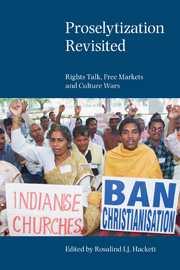Book contents
- Frontmatter
- Contents
- Preface and acknowledgements
- Contributors
- Revisiting Proselytization in the Context of Rights Talk, Free Markets and Culture Wars
- Section I
- Section II
- Section III
- Section IV
- Section V
- Proselytization or Information? Wicca and Internet
- You Can't Talk to an Empty Stomach: Faith-based Activism, Holistic Evangelism, and the Publicity of Evangelical Engagement
- Proselytization: Closing Thoughts from a Sociologist
- Index
Proselytization: Closing Thoughts from a Sociologist
from Section V
- Frontmatter
- Contents
- Preface and acknowledgements
- Contributors
- Revisiting Proselytization in the Context of Rights Talk, Free Markets and Culture Wars
- Section I
- Section II
- Section III
- Section IV
- Section V
- Proselytization or Information? Wicca and Internet
- You Can't Talk to an Empty Stomach: Faith-based Activism, Holistic Evangelism, and the Publicity of Evangelical Engagement
- Proselytization: Closing Thoughts from a Sociologist
- Index
Summary
Introduction
This fine collection on the timely topic of proselytization offers much to students and scholars of religion from many fields, including the history of religions, comparative world religions, religious studies, the sociology, social psychology, and psychology of religion, as well as specific areas within some of those disciplines, especially studies of new and minority religions, studies of conversion and recruitment, and the effects of globalization on religion (and vice-versa: see Beckford 2003, 103–44). My comments will be made from the point of view of a sociologist/social psychologist of religion with a strong interest in how law affects religion and religious groups in modern societies.
Rosalind Hackett, the editor of this informative collection, offered some insightful comments in her introduction to the volume, noting that religious proselytization has become one of the more controversial topics in today's world. The free market of religious ideas that is supposed to exist in modern societies has not materialized. Instead, there is great concern in many nations about the issue of proselytization. Indeed, proselytization has become a flash-point in our contemporary world, even in some long-term democratic societies such as France and Belgium (Beckford 2004; Luca 2004; Fautré 2004; Duvert 2004). Other societies governed by more authoritarian regimes also have severe concerns about proselytization, particularly if those regimes espouse an ideology perceived to be challenged by religious proselytization (Hanks 2004; Rahn this volume; Mayer this volume).
- Type
- Chapter
- Information
- Proselytization RevisitedRights Talk, Free Markets and Culture Wars, pp. 455 - 464Publisher: Acumen PublishingPrint publication year: 2008



